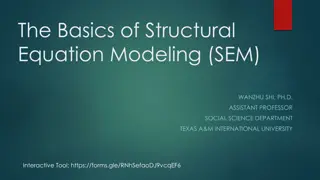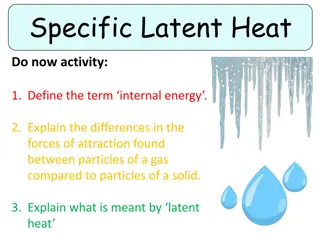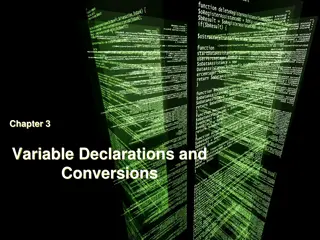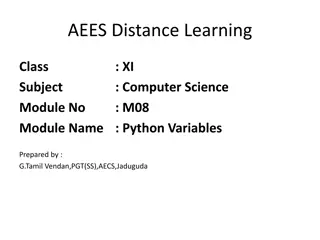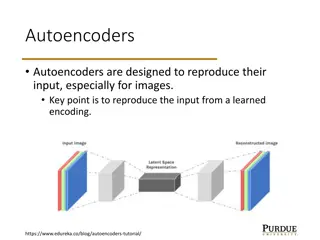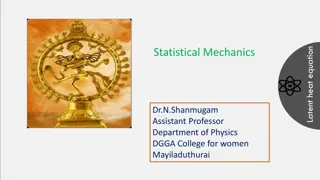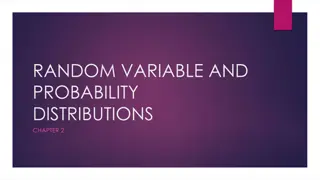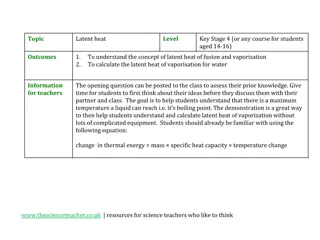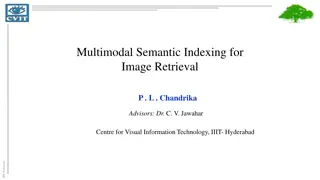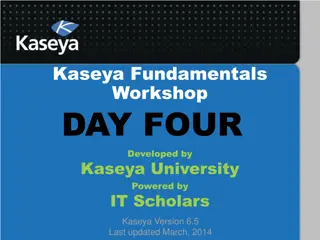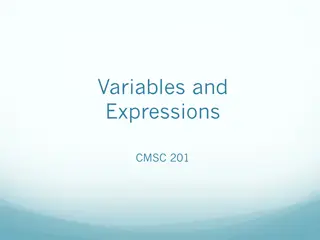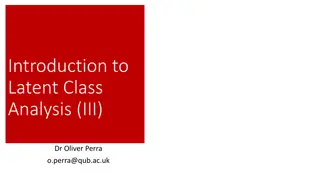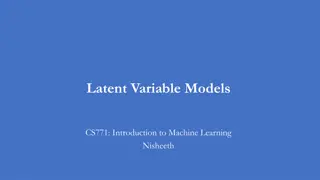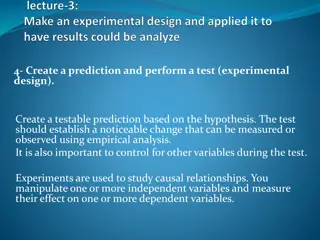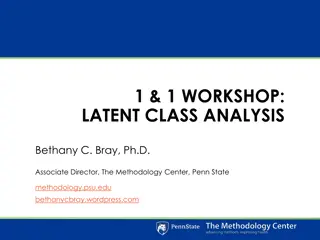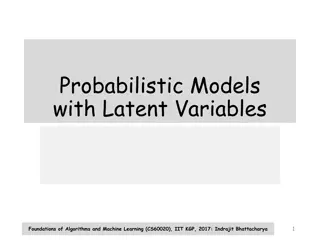Variables in Research Studies
Variables in research studies play crucial roles in examining relationships and drawing conclusions. They include independent variables that influence outcomes, dependent variables affected by independent ones, moderator variables that strengthen or weaken relationships, intervening variables lying
10 views • 34 slides
Variables and Control in Research Design
In research design, variables play crucial roles as either dependent or independent factors, with extraneous variables potentially affecting study outcomes. Controlling for extraneous variables is essential to attribute effects solely to the independent variables. Research hypotheses aim to test pre
6 views • 6 slides
Structural Equation Modeling (SEM) and Quality of Life Analysis
Structural Equation Modeling (SEM) is a statistical technique used to analyze relationships between variables, including quality of life factors such as physical health and mental well-being. Quality of life is a multidimensional concept encompassing various aspects like social relationships, living
5 views • 21 slides
Specific Latent Heat and Particle Changes
Internal energy, forces of attraction in gases vs. solids, and latent heat concepts are explained. Particles changing state are visualized through a graph. Self-assessment points and the calculation for specific latent heat of fusion are discussed. The rearrangement of the equation for specific late
19 views • 20 slides
Variable Declarations and Conversions in Java
Properly declaring variables in Java is essential before using them. This chapter covers different types of variable declarations, including class variables, instance variables, local variables, and parameter variables. It also explains the concept of type casting and the importance of explicitly de
3 views • 23 slides
Latent Transition Analysis: A Comprehensive Overview
Latent Transition Analysis (LTA) is a statistical method that identifies unobservable groups within a population using observed variables, aiding in profiling individuals and tracking transitions over time. It is particularly useful for modeling categorical constructs, informing prevention and inter
1 views • 23 slides
Python Variables: Understanding Declaration, Naming Rules, and Assignment Operators
Python variables are essential for storing values in reserved memory locations. This article covers the basics of variables in Python, including declaration, assigning values, naming rules, multiple assignments, deleting variables, and assignment operators. Learn how to create, name, and manipulate
32 views • 11 slides
Variables in Educational Research
Variables in educational research play a crucial role as symbols of events, traits, or characteristics that can be measured and categorized. Different types of variables such as change, effect, and outcome variables are essential in studying causal relationships. Dependent variables represent outcom
8 views • 17 slides
Latent Print Development Techniques
Latent prints, hidden impressions left behind by sweat pores on surfaces, can be developed using physical and chemical methods. Factors affecting latent prints include surface type, movement during contact, handling, and environmental conditions. Various surfaces require specific development techniq
2 views • 29 slides
Variational Autoencoders (VAE) in Machine Learning
Autoencoders are neural networks designed to reproduce their input, with Variational Autoencoders (VAE) adding a probabilistic aspect to the encoding and decoding process. VAE makes use of encoder and decoder models that work together to learn probabilistic distributions for latent variables, enabli
10 views • 11 slides
Phase Transformations and Latent Heat Equation in Statistical Mechanics
In this informative piece by Dr. N. Shanmugam, Assistant Professor at DGGA College for Women, Mayiladuthurai, the concept of phase transformations in substances as they change states with temperature variations is explored. The latent heat equation is discussed along with definitions of fusion, vapo
14 views • 22 slides
Random Variables and Probability Distributions
Random variables are variables whose values are unknown and can be discrete or continuous. Probability distributions provide the likelihood of outcomes in a random experiment. Learn how random variables are used in quantifying outcomes and differentiating from algebraic variables. Explore types of r
2 views • 13 slides
Variables in Physics: A Comprehensive Guide
This presentation introduces and explains different types of variables in Physics, emphasizing the concepts of independent, dependent, and control variables. It provides practical examples and tips for identifying variables in experiments, aiming to enhance students' understanding of scientific meth
5 views • 24 slides
Latent Heat of Vaporisation through Demonstration
Students will learn about latent heat of fusion and vaporisation, specifically focusing on calculating the latent heat of vaporisation for water. Through a hands-on demonstration, students will understand the concept that a liquid cannot exceed its boiling point temperature, as energy is used to bre
0 views • 4 slides
Multimodal Semantic Indexing for Image Retrieval at IIIT Hyderabad
This research delves into multimodal semantic indexing methods for image retrieval, focusing on extending Latent Semantic Indexing (LSI) and probabilistic LSI to a multi-modal setting. Contributions include the refinement of graph models and partitioning algorithms to enhance image retrieval from tr
2 views • 28 slides
Kaseya Fundamentals Workshop - Agent Procedures and Variables Overview
Discover the key aspects of Agent Procedures and Variables in Kaseya Fundamentals Workshop, including Managed Variables, Global Variables, and Public Variables. Explore examples of Agent Procedures and learn about Application Deployment, Windows Registry Modification, and more. Gain insights into Pr
2 views • 23 slides
Latent TB Infection and its Implications
Latent TB infection serves as a reservoir for active TB disease, posing a significant global health burden, especially among high-risk populations such as people living with HIV and household contacts of TB patients. With 1.7 billion people estimated to be infected with LTBI globally, targeted inter
1 views • 57 slides
Introduction to Variables and Expressions in Python
Today we start Python! Learn about variables, how to create them, assign values, and perform mathematical operations using variables in Python. Understand the rules for naming variables and how they are essential for storing and managing information in your programs. Explore different types of varia
7 views • 16 slides
Variables in Economics
Variables in economics, such as dependent, independent, endogenous, and exogenous variables, play a crucial role in analyzing economic phenomena. Dependent variables are influenced by changes in other variables, while independent variables are not. Endogenous variables are internal and need to be pr
8 views • 8 slides
The Art of Variables in Programming and Delicious Sandwiches
Explore the concept of variables in programming using fun analogies of creating a PBJ sandwich and a s'more. Understand how variables act as containers to store important information in code. Discover the ingredients needed for each delicious treat and learn how variables play a crucial role in both
2 views • 5 slides
Latent Class Analysis: Estimation and Model Optimization
Latent Class Analysis (LCA) is a person-centered approach where individuals are assigned to different categories based on observed behaviors related to underlying categorical differences. The estimation problem in LCA involves estimating unobservable parameters using maximum likelihood approaches li
1 views • 30 slides
Latent Variable Models in Machine Learning
Latent variable models play a crucial role in machine learning, especially in unsupervised learning tasks like clustering, dimensionality reduction, and probability density estimation. These models involve hidden variables that encode latent properties of observations, allowing for a deeper insight
4 views • 10 slides
Designing a Controlled Experiment: Steps and Considerations
Experimental design involves systematically testing hypotheses by manipulating independent variables and measuring their effects on dependent variables. This process includes considering variables, designing treatments, assigning subjects to groups, and planning measurements. To ensure valid conclus
4 views • 11 slides
Latent Variable Modeling in Statistical Analysis
Latent Variable Modeling, including Factor Analysis and Path Analysis, plays a crucial role in statistical analysis to uncover hidden relationships and causal effects among observed variables. This method involves exploring covariances, partitioning variances, and estimating causal versus non-causal
3 views • 59 slides
Natural Sciences Grade 7
Variables play a crucial role in scientific investigations as they are the elements that change and are measured during experiments. There are two main types of variables - dependent and independent. Dependent variables respond to changes in independent variables, which are manipulated by the experi
3 views • 8 slides
Bayesian Perspectives on Latent Variable and Structural Equation Models
This paper delves into Bayesian approaches for latent variable and structural equation models, covering topics such as advantages and cautions, widening applications beyond psychology and education, and examples of spatial common factors and nonlinear factor models. It discusses the origins of laten
1 views • 71 slides
Workshop on Latent Class Analysis: An Introduction
This workshop provides a conceptual introduction to Latent Class Analysis (LCA) by Bethany C. Bray, Ph.D., exploring the identification of latent classes and model selection. Learn about latent classes of adolescent drinking behavior, including model parameters and the inclusion of covariates. Disco
1 views • 57 slides
Applications of Latent Tree Models in Data Analysis
Latent Tree Models (LTM) offer a versatile approach for data analysis, enabling the discovery of various patterns in different types of data. They are particularly useful for identifying co-occurrence and correlation patterns, as well as uncovering latent structures and variables. With applications
2 views • 65 slides
X-Ray Film Processing
X-ray film processing involves the formation of a latent image through sensitized crystals reacting to radiation, capturing and trapping electrons to create sensitivity sites. The irradiation of the film chemically changes the crystals, leading to the formation of a latent image. Development convert
1 views • 50 slides
Discriminative Latent Variable Model for Online Clustering
Explore a novel discriminative latent variable model, Latent Left-Linking Model (L3M), for jointly learning metric and clustering in online clustering tasks. Learn about the efficient learning algorithm, likelihood computation, and more in this informative study.
1 views • 22 slides
Packed Bed Latent Heat Storage in Thermal Energy Systems
Explore the concept of packed bed latent heat storage in thermal energy systems with a focus on using paraffin as a phase change material. Learn how this technology enhances thermal energy storage efficiency and discover the modeling and results of a latent heat storage unit.
0 views • 9 slides
Phase Transformation and Latent Heat Equation in Statistical Mechanics
Explore the concept of phase transformation and latent heat equation in Statistical Mechanics. Learn about the different processes such as fusion, vaporization, and melting, as well as the significance of boiling point, melting point, and latent heats. Discover the role of Gibbs free energy in deter
0 views • 22 slides
Foundations of Probabilistic Models with Latent Variables
Explore the foundations of probabilistic models with latent variables in algorithms and machine learning. Learn about density estimation, latent variables, generative mixture models, and tasks in a mixture model. Discover concepts like unsupervised learning, sub-populations, and parameter estimation
2 views • 29 slides
Random Variables and Expectations in Engineering Applications
This content discusses expectations of random variables and functions of random variables in ECE 313 Probability with Engineering Applications. Topics cover important distributions such as hypo-exponential, Erlang, and hyper-exponential, along with the calculation of expectations for various random
5 views • 26 slides
Latent Tree Models in Machine Learning
Explore the fundamentals of Latent Tree Models in machine learning, covering basic properties, Bayesian networks, joint distributions, Pouch Latent Tree Models, and more. Learn about the relationship with finite mixture models and phylogenetic trees.
0 views • 28 slides
Latent Variable Models in Educational Research
Explore the concept of latent variable models in educational research through modeling item response profiles using factor models, latent class models, and latent variable hybrids. Learn how these models can be applied in practice to analyze item response data and uncover patterns in examinee classe
2 views • 25 slides
Fundamentals of Factor Analysis
Factor Analysis (FA) is an advanced statistical method used to analyze relationships among variables. It helps in identifying underlying patterns and grouping variables that are correlated. Through factors extraction and rotation, FA simplifies complex data sets and aids in interpretation and decisi
2 views • 26 slides
Understanding Relationship Dynamics: Independent Variables vs. Antecedent Variables
Dive into the distinction between independent and antecedent variables in research, exploring how antecedent variables precede the focal independent variables to shed light on the genesis of relationships. Learn how these variables play a crucial role in studying phenomena like meditation, happiness
0 views • 6 slides
Understanding Global and Local Variables in Python Functions
Explore the concept of global and local variables in Python functions. Global variables are declared outside functions and can be accessed globally, while local variables are defined inside functions with limited scope. Learn how to work with global and local variables, as well as using the global k
1 views • 17 slides
Understanding Latent Traits in Testing: Classical Test Theory vs. Item Response Theory
Explore the concepts of latent traits in testing through a comparison of Classical Test Theory (CTT) and Item Response Theory (IRT). Learn about the fundamental differences in approach, statistical analysis methods, and the importance of understanding latent variables in test assessment.
1 views • 38 slides


